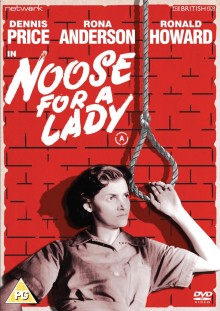 Director: Wolf Rilla
Director: Wolf Rilla
Screenplay: Rex Rienits
Starring: Dennis Price, Rona Anderson, Ronald Howard, Pamela Alan
Year: 1953
Country: UK
Running Time: 70 mins
BBFC Classification: PG
The directorial debut of German-born writer, producer and director Wolf Rilla (cool name), Noose for a Lady opens with the quote: ‘Better a hundred guilty escape than one innocent be hanged’. We’re then transferred to the Old Bailey where Margaret Hallam is being sentenced to death for the apparent murder of her husband. She is accused of poisoning him with Barbitone sleeping tablets, a type that she uses herself.
Cut to Margaret’s cousin, Simon Gale, arriving at her home looking for her, not knowing that she’s now in prison with just seven days to live. Margaret’s step-daughter greets him and lets him know what has happened during his absence – he’s a District Attorney in Uganda. He decides to stay on and do some sleuthing and try to find out who really killed Mr Hallam.
It quickly becomes apparent that few people actually liked Mr Hallam, who enjoyed seeing people suffer, at least mentally. Apparently he had discovered quite a few skeletons in the closets of most of the villagers nearby and enjoyed taunting them, threatening to ‘out’ their dubious activities or sullied pasts. Of course this means that Simon’s list of murder suspects grows exponentially.
After a fair bit of toing and froing, and some false leads, Simon soon has a good idea of who the real killer is and sets up a trap to unmask the murderer during a very English tea party.
Based on a novel by Gerald Verner, which in turn was apparently based on a radio play of the same name, Noose for a Lady is decidedly old school in its execution and plays out like a missing Agatha Christie play, replete with a final ‘all the suspects gathered in the drawing room’ scene, whereby our hero reveals who the real bad guy is. It’s all rather stagey with just a couple of outside locations (the outside of a pub – ‘The Running Mare’, being one), and the dialogue is delightfully twee and very proper; for example, when Simon turns on the stepdaughter, swear words are not on the agenda when he says: ‘Oh, blow the evidence!’ This is an England of times gone past where people invited others ‘round for afternoon tea’ and they ‘don’t do anything on a Sunday afternoon after church’. The most exciting thing that usually happens in this sleepy English village is when the retired major necks two Sherries in a row!
The film, like many others of this age, is an interesting historical record of when the most dangerous person in a local area was the poacher that everyone knew about, of when biscuits where seen in jars on the bar of your local public house and when everyone smoked because no one knew they were slowly killing themselves.
Noose for a Lady is well shot, although the direction is functional rather than exciting. The sound is a little soft in places with occasional hiss, particularly near reel changes; having said that the picture quality is pretty good for a film of this age. The acting is good throughout, with everyone bringing engaging performances to the table, especially Denis Price as the avuncular Simon Gale and Esma Cannon as the unpleasant Miss Ginch (or should that be Grinch!).
I guess one of my main criticisms of the film would be that it doesn’t really make us as sympathetic as we should be toward the plight of poor old Margaret Hallam who has precious little screen time with which to engage our loyalty. I think if we had more emotion invested in her ‘story’ then the film would have been a lot more tense, as we’d have felt that there was more at stake. There’s also a tendency toward too much talk, but that’s not really surprising if this was originally a radio play.
All in all I’d recommend Noose for a Lady to those who enjoy a good ‘Midsummer Murder’ type of plot to go with their Sunday afternoon cup of tea.





Reviewer: Justin Richards
Noose for a Lady has recently been released on DVD and is being distributed by Network Distributing who are currently releasing lots of these rarer British film titles.
If you’re listening Network, other films you might want to track down are Peter Maxwell’s Dilemma (1962); Offbeat (1961) – directed by Cliff Owen; The Singer not the Song (1960) – with Dirk Bogarde; Harley Cokeliss’s The Glitterball (1977); and Hennessy (1975), directed by Don Sharp.
The only extras on the review disc were an admittedly cool trailer and seven stills from the film, including a film poster.



I have the clock that was shown in the pub with Denis standing in front of it talking to the lady.